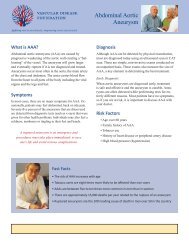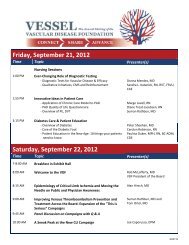V08-N04 - Vascular Disease Foundation
V08-N04 - Vascular Disease Foundation
V08-N04 - Vascular Disease Foundation
You also want an ePaper? Increase the reach of your titles
YUMPU automatically turns print PDFs into web optimized ePapers that Google loves.
VDF HealthCasts Continue<br />
The <strong>Vascular</strong> <strong>Disease</strong> <strong>Foundation</strong> is proud to continue<br />
its audio HealthCasts that cover all aspects of vascular<br />
disease. Our guests are the leading scientific and clinical<br />
experts in their respective fields.<br />
HealthCasts are hosted by Dr. David Meyerson and<br />
produced by Dr. Kerry Stewart. Dr. Meyerson is a cardiologist<br />
at Johns Hopkins and a scientific advisor to VDF. Dr.<br />
Stewart is a Professor of Medicine at Johns Hopkins and a<br />
former member of the VDF Board of Directors.<br />
Here are the latest HealthCasts episodes and topics:<br />
Episode 25: Thrombophilia. Dr. John R. Bartholomew,<br />
Section Head for <strong>Vascular</strong> Medicine in the Department of<br />
<strong>Vascular</strong> Medicine at the Cleveland Clinic, a leading expert on<br />
thrombophilia, discusses what thrombophilia is, who is at risk,<br />
and who should be tested.<br />
Episode 26: Focus on Blood Clots. Drs. Meyerson and<br />
Stewart discuss what you need to know about the causes, symptoms,<br />
and treatment of blood clots.<br />
HealthCasts may be found on VDF's Web site at<br />
www.vdf.org/resources, iTunes, Feedburner, Yahoo, and<br />
other sites. Listening instructions and a complete description<br />
of each episode may be found on VDF's Web site. Our<br />
continued thanks go to Drs. Meyerson and Stewart for volunteering<br />
their time and energy to the creation and production<br />
of these informative HealthCasts.<br />
HealthCast Hosts Dr. David Meyerson (left)<br />
and Dr. Kerry Stewart (right)<br />
Listen to HealthCasts at<br />
www.vdf.org<br />
Kidney Failure continued from Page 6<br />
An uncommon but serious problem can be coldness,<br />
tingling, numbness, aching, weakness, or bluish discoloration<br />
of the hand, indicating that not enough blood<br />
flow is getting to the hand. The dialysis access may be<br />
“stealing” blood flow from the hand. If that occurs, a surgeon<br />
will need to perform a minor operation to restore<br />
more blood flow to the hand. The dialysis treatments can<br />
then continue using the fistula or graft.<br />
Patients should follow the doctor's recommendations<br />
for diet and fluid restrictions between dialysis treatments.<br />
A dietician will teach patients what they need to know<br />
about eating less protein, restricting salt intake, and<br />
drinking a safe amount of fluid. This will make treatments<br />
easier and help patients feel better. Most patients<br />
take vitamin and mineral supplements. It is also important<br />
to take all medications as prescribed by your doctor.<br />
Doctors, nurses, pharmacists, social workers, and<br />
dieticians will all form a partnership with patients on<br />
dialysis treatments. They can help reduce the side effects<br />
of nausea, dizziness, low blood pressure, cramps, or<br />
headaches during treatments. Changes in the dialysis<br />
time, sodium, or fluids can be made for each patient's<br />
special needs. Staff will make the treatments as comfortable<br />
as possible, and lab tests are taken monthly to<br />
ensure that patients are receiving the proper amount of<br />
dialysis.<br />
The patients may have to make changes in their daily<br />
life which involve work, family, friends, and activities.<br />
Some patients choose to have their treatments at home<br />
rather than in a dialysis center or hospital. A dialysis-care<br />
partner can be trained to assist the patient at home,<br />
which must be equipped with enough space for the<br />
equipment, water, and adequate electricity to operate the<br />
dialysis machine. Members of the health-care team will<br />
partner with the patient to help make decisions about<br />
those daily changes in lifestyle.<br />
Patients will need dialysis treatments for the rest of<br />
their life unless they are able to receive a kidney transplant.<br />
A kidney transplant is not for everyone, and most<br />
recipients of a kidney must undergo temporary dialysis.<br />
Dialysis remains the lifeline to keep a person well and<br />
help him or her maintain an active lifestyle. There are<br />
many resources for additional information; The Kidney<br />
<strong>Foundation</strong> www.kidney.org; American Association of<br />
Kidney Patients www.aakp.org; or American Kidney<br />
Fund www.akfinc.org.<br />
About the Author: Victoria L. Gilpin, FNP-BC is a nurse<br />
practitioner at University Hospital and Clinics, Patient<br />
Services/<strong>Vascular</strong> Surgery Division, Columbia, MO.<br />
Keeping in Circulation • www.KeepingInCirculation.org • 888-VDF-4INFO<br />
7







